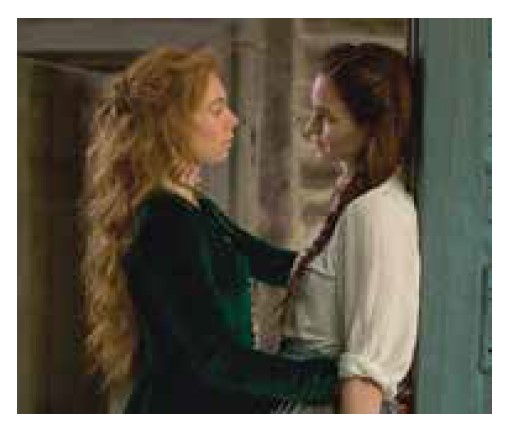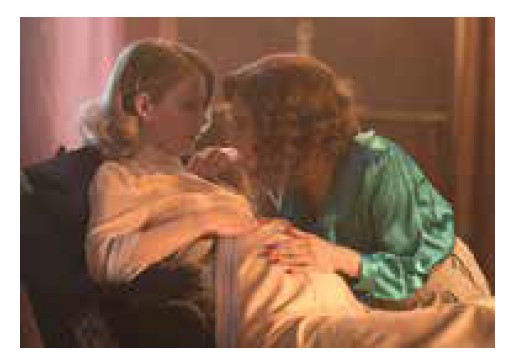
By Gary Kramer–
Two lesbian dramas set in the past—one stirring, the other enervating—are available on demand this month.
The World to Come is a beguiling film set in upstate New York, 1856. Abigail (Katherine Waterston) is mourning the recent loss of her daughter and eking out an unhappy life with her husband Dyer (Casey Affleck) on a farm. Her dull life changes, however, when she meets her new neighbor Tallie (Vanessa Kirby), the wife of Finney (Christopher Abbott). Director Mona Fastvold chronicles how these two oppressed women find a measure of happiness together. As the two women continue to meet, they become more intimate, silently testing the waters of their forbidden attraction. Viewers will feel a spark of electricity between them.
The World to Come is leisurely paced and provides a strong sense of time and place. The film generates most of its interest in the tender scenes between the two women. Abigail offers to warm Tallie’s feet one day when she arrives during a snowstorm. And when the women later give in to their pent-up desires and kiss each other hungrily, Fastvold depicts an ecstatic moment of Abigail experiencing “astonishment and joy.” Even better is a scene where the women talk about their relationship. Both women are empowered, albeit in different ways, giving them imagination, courage, and agency, however limited.

Fastvold emphasizes the social constraints these women must endure and, while The World to Come does feel stifling at times, that is to the film’s credit. When Dyer catches Abigail in a lie, he suspects something is going on between his wife and Tallie. But his response is not nearly as severe as Finney’s concerns that Tallie is acting inappropriately.
Of course, the film builds its dramatic tension on the affair being discovered, but there is also hope that the love between these women can survive.
The actresses are lovely together, and both give excellent performances. Waterston is luminous as Abigail. As Tallie, Kirby displays a confidence—she often speaks with conviction—but also exudes an air of mystery about her that is attractive. The tender scenes of the women kissing and caressing each other in bed flash briefly across the screen, but they suggest the depth of the women’s passions.
The Affair, however, is a stilted adaptation of Simon Mawer’s novel, The Glass Room. It depicts the lives and relationship between two friends, Liesel (Hanna Alström) and Hana (Carice van Houten), which begins in the 1930s in Czechoslovakia.

As the film opens, Liesel is marrying Viktor (Claes Bang), and they plan to live in an extravagant house built for them, with rooms of glass, and a wall of onyx stone that glows red when the sun hits it. It is a glorious, happy time for Liesel, but Hana is troubled. When she soulfully admits that she cannot have children, Liesel is sympathetic. The affection between these two women during this tender moment is profound, but The Affair downplays it.
The film’s first act instead concentrates on Viktor’s infatuation with Kata (Alexandra Borbély), a governess who comes to care for the couple’s children. When Liesel discovers her husband’s affair, Hana comforts her. Alas, the vulnerable Liesel jerks her hand away from touching Hana’s breast, and she breaks her would-be lover’s necklace. The beads bounce along the floor in a portentous moment of heavy-handed, slow-motion obviousness.
Alas, The Affair keeps the women apart for most of the rest of the film. That narrative strategy should build desire for the characters to reunite and consummate their love, but director Julius Sevcik fails to get viewers deeply invested in their lives. Moreover, the narrative shifts away from Liesel once the Nazis come to power (both women are married to Jewish men). Viktor and Liesel leave for Switzerland, while Hana stays in Czechoslovakia.
However, Hana does not engender much emotion; as she experiences passions or hardships, they fail to have any impact. Van Houten is stranded by a screenplay that makes Hana mostly passive, even in her most compelling moment—when she is summoned by Soviet authorities regarding the love letters she has been sending to Liesel.
In contrast, Hanna Alström captures the fragility of her character well, but she is off screen for too long. Viewers will likely want more of her and more scenes of Liesel and Hana together. When the women do eventually reconnect, Sevcik inexplicably edits their reunion, cutting twice to Liesle’s adult son Martin (Vladímir Polívka) in a nightclub, a scene that serves no real purpose. It may be that The Affair has been edited down from a longer version, because there are several head-scratching moments like this.
Most of The Affair is dreadful. But it looks glossy, and the house is fabulous. The actors are also very good looking, and the film is handsomely made. But, overall, this is a flavorless dish of Europudding.
© 2021 Gary M. Kramer
Gary M. Kramer is the author of “Independent Queer Cinema: Reviews and Interviews,” and the co-editor of “Directory of World Cinema: Argentina.” Follow him on Twitter @garymkramer
Published on March 11, 2021
Recent Comments